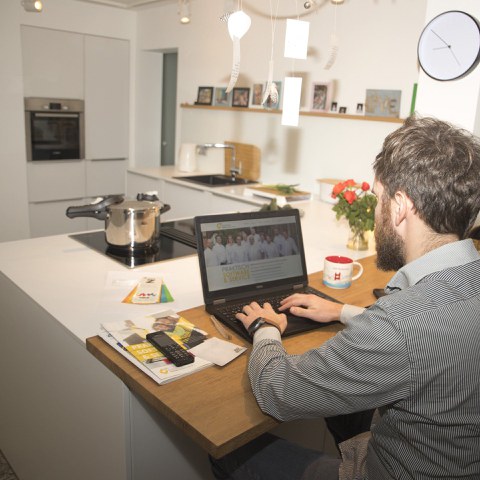Apr 03, 2020
TU Dresden’s occupational psychologists provide advice for working remotely
In order to curtail the further spread of the coronavirus, many employees are working from home. A large majority of TUD staff keep teaching, research and the administration running remotely during the emergency operations mode. Dr Denise Dörfel, research and teaching associate at TUD’s Chair of Work and Organisational Psychology, knows that this abrupt change may be difficult to handle. In cooperation with colleagues from the University Health Management, the occupational psychologist has put together some recommendations for healthy working in the confines of one's own flat.
Dr Dörfel advises to set up a well-equipped workplace that is clearly separated from the rest of the living space and where one is exposed to as few distractions as possible. Especially at home, employees should structure their daily routine well, and adhere to fixed work and break times to help create an adequate work-life balance. “Short-term breaks are recommended, which means taking a ten-minute break approximately every two hours. Research shows that short breaks increase work efficiency, even though the effective working time is reduced. If necessary, you should set an alarm clock”, explains Dr Dörfel. The breaks are intended for recreation and can be used for physical exercise. Under no circumstances should they be used to clean the home, unless this activity has a relaxing effect.
In the home office, it is also particularly important to set specific and realistic goals and an appropriate amount of work for the day. Familiar activities can take up more time at home than at work. New tools and different work equipment require a certain amount of familiarisation, and you may need more help from colleagues or other departments. It is thus equally essential to maintain social contacts with your working environment. Keeping in touch with colleagues - even beyond regular team meetings - can be done by taking virtual coffee breaks via video or telephone conference or in a group chat.
Dr Denise Dörfel once again emphasises the exceptional situation: The current situation can trigger tension, stress, anxiety, and also anger or feelings of guilt. These feelings are perfectly normal and understandable. Active stress regulation can help in dealing with these feelings better. This includes allowing these feelings and not being too strict with oneself. People should try to find positive thoughts to reduce their own stress levels. Certainly, a closer look at the current situation will reveal a few good points, such as “The fact that I am not always available to everyone relaxes me.” Frequent brooding and excessive media consumption should be avoided, as both create additional stress. “Breathing exercises or small rewards after achieving goals, such as reading, baking or pursuing a hobby, can provide the necessary work-life balance,” says the psychologist.
You can find the detailed recommendations here. TU Dresden’s employees can contact the Occupational Health Services () or use the psycho-social counselling hotline (Tel. 0351/463-82082) if they feel stressed or have personal questions on this topic. This service is available from Monday to Thursday from 9 a.m. to 12 noon and 2 p.m. to 5 p.m. and on Fridays from 9 a.m. to 12 noon.
Media enquiries
Dr. Denise Dörfel
Chair of Work and Organisational Psychology

